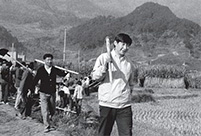 Top 100 beauties in the world!
Top 100 beauties in the world!
 Gallery: Who is the most beautiful one?
Gallery: Who is the most beautiful one?
 If you like autumn, put your hands in the air!
If you like autumn, put your hands in the air!
 Fan Bingbing's "Queen style" in new play
Fan Bingbing's "Queen style" in new play
 Lingerie show at 2014 Miss China
Lingerie show at 2014 Miss China
 J-10 fighters show aerobatic stunts in smog-free sky
J-10 fighters show aerobatic stunts in smog-free sky
 Charming contestants of Shanghai Int’l Model Contest
Charming contestants of Shanghai Int’l Model Contest
 Most amazing chi-pao beauties
Most amazing chi-pao beauties
 7 deadly animal attacks
Russia to launch 70 Proton rockets by 2020: official
7 deadly animal attacks
Russia to launch 70 Proton rockets by 2020: officialTEHRAN, Nov. 26 -- Recent extension of the Nov. 24 deadline for Iran's nuclear talks was a "landmark" in the history of the Islamic revolution, an Iranian expert told Xinhua on Wednesday.
"I think the history will prove that (recent) Vienna (meeting) was a landmark in Islamic revolution, because, for the first time in 35 years, Iran and the United States sat down, they argued, they talked and they reached several understandings, several agreements," said Dr. Sadeq Zibakalam, a professor of political science with Tehran University.
After seven days of intensive nuclear talks failed to meet the deadline for a comprehensive deal over Tehran's controversial nuclear program, the foreign ministers from the Islamic republic and the P5+1 group agreed on Monday to extend the deadline for another seven months, in an attempt to secure the prospects of a deal.
Based on the agreement, the interim Geneva deal, or the so- called Joint Plan of Action which was sealed on Nov. 24, 2013, will also be extended by June 30, 2015 and the talks will resume in December.
Holding several rounds of bilateral meetings between the Iranian foreign minister and his American counterpart in Vienna recently was a signal for reducing differences between two the countries in the future, Zibakalam said.
"I think Vienna talks is neither a victory nor a defeat. It is a landmark. It proves that there can be peace; there can be negotiation; there can be fruitful negotiation between Iran and the United States," he said, adding that hardliners of both sides had said that it was impossible in the past 35 years.
The Iranian scholar alluded to some local media's reaction to the extension of the talks, saying some hardliner newspapers in Tehran are "very angry," because they have realized that the U.S. government is eager to make peace with Iran, and the Iranian government is also ready to respond."
On Tuesday, the hardline Kayhan newspaper wrote "based on the ambiguous agreement (in Vienna), the sanctions and the suspension of Iran's nuclear activities were extended." The paper had previously warned about the West's unwillingness for an accord to let Iran enjoy its "nuclear rights."
At this juncture the extension of the "bad and ambiguous Geneva deal is their best option," it added.
Hardliners in Iran are worried, because the "anti-Americanism is cracking," Zibakalam said, adding that it's a sign of improvement of Iran-U.S. relations in future, which might serve as a means to a nuclear agreement.
Monday's agreement provided further time and space for a framework deal by March 1 and a full agreement by July 1 that should include all technical aspects.
In the following seven months, nothing will change dramatically, but there could be agreements on a limited number of points, on the thorny issues, the professor said.
The Iranians will come to realize that the sanctions, either by the UN Security Council or by the United States and the European Union, cannot be removed overnight. Also, once the United States realized that the Iranians are abiding by their commitments in the previous agreements, the gaps will be narrowed down, Zibakalam said.
"I'm still optimistic about the result seven months later," he said. "If everything goes well, during these seven months, the good atmosphere will help the negotiation."
 Female soldiers
Female soldiers Celebrity goddesses
Celebrity goddesses  Official trailer of Y-20
Official trailer of Y-20 Photos: Xi Jinping in Fujian
Photos: Xi Jinping in Fujian Standard faces for each countries
Standard faces for each countries China-made military transport aircraft gets ready
China-made military transport aircraft gets ready World Pole Dance Championship in China
World Pole Dance Championship in China 59-year-old Liu Xiaoqing still looks stunning
59-year-old Liu Xiaoqing still looks stunning  Shocking! Photos of Chinese fighters revealed
Shocking! Photos of Chinese fighters revealed Mainland attitude sealed fate of HK protest
Mainland attitude sealed fate of HK protest Ignorance, psychological concerns surround AIDS phobia
Ignorance, psychological concerns surround AIDS phobia A cure for isolation
A cure for isolation CNPC to sell oil field stakes: report
CNPC to sell oil field stakes: reportDay|Week|Month